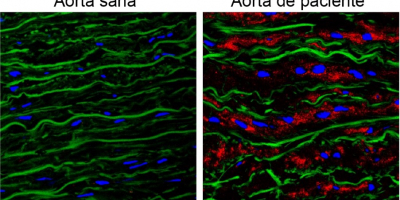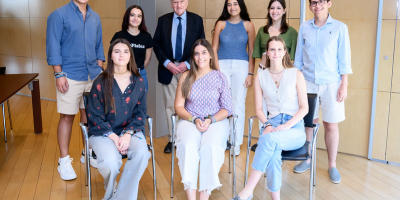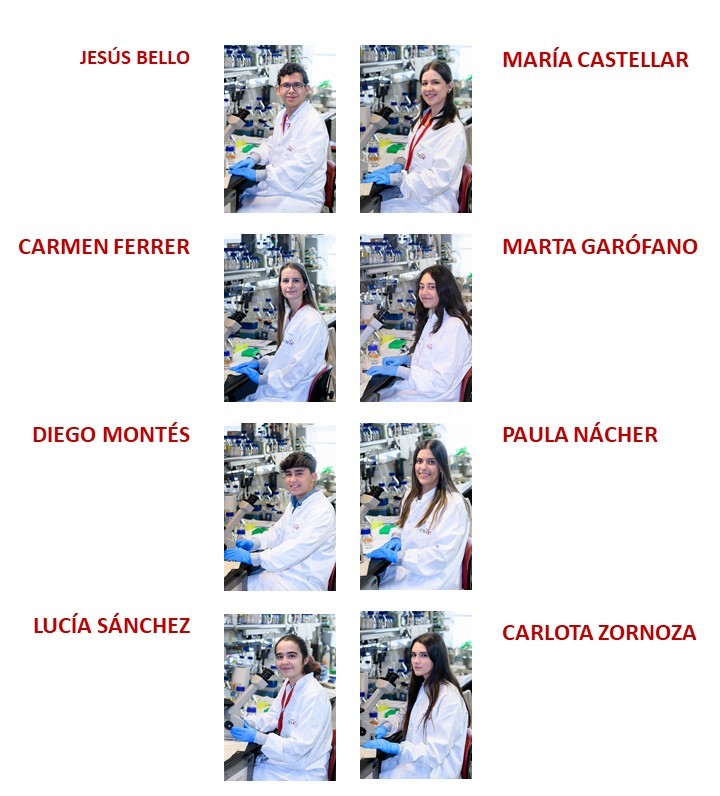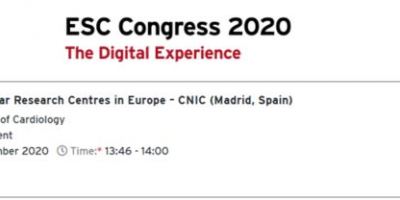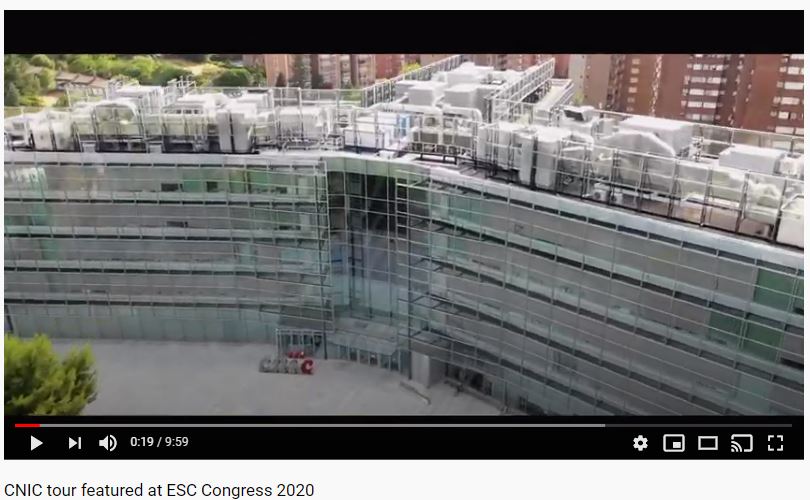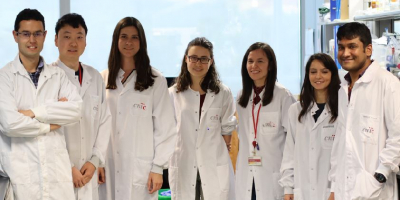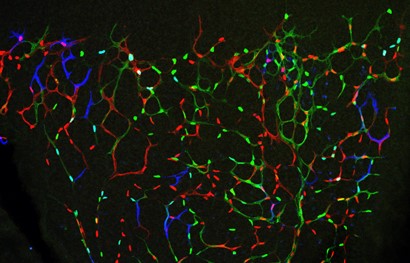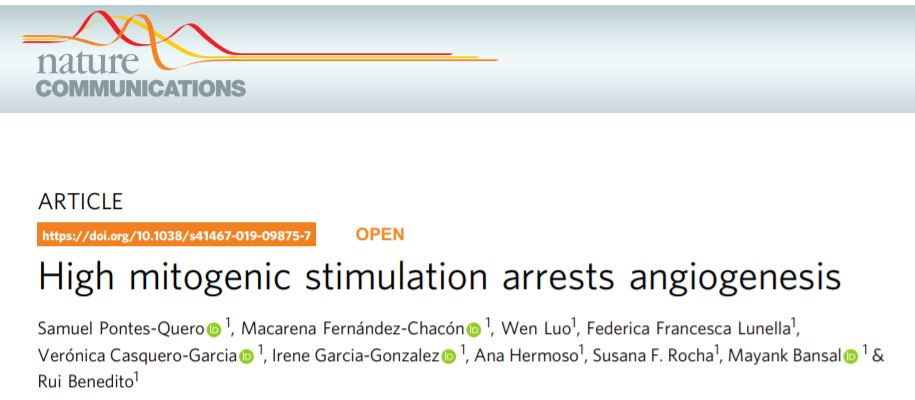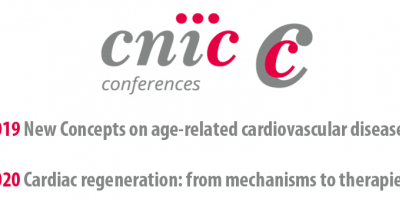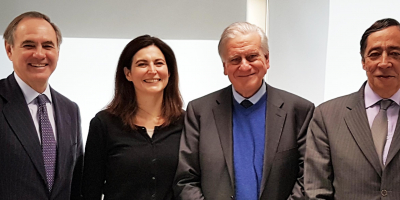Press room
|
3 Jan 2024 EMBO Molecular Medicine: Accumulation of the protein versican is the cause of aortic aneurysm in Marfan syndrome A team led by scientists at the CNIC and CSIC has found that accumulation of versican in the aortas of Marfan syndrome patients triggers the activation of the nitric oxide pathway through the activation of the the protein AKT A team of Spanish scientists has identified the cause of aortic aneurysm in patients diagnosed with Marfan syndrome, a genetic disorder currently lacking treatment options. The study, published in the journal EMBO Molecular Medicine, was conducted by researchers at the Centro Nacional de Investigaciones Cardiovasculares (CNIC), an affiliate center of the Carlos III Health Institute (ISCIII) attached to the Spanish Ministry of Science, Innovation, and Universities, in collaboration with partners at the Centro de Biología Molecular Severo Ochoa (CBMSO, CSIC). The study, led by CBMSO scientists Juan Miguel Redondo and Miguel R. Campanero, reports an accumulation of a proteoglycan called versican—a large protein present in the extracellular matrix between cells—in the aortas of patients with Marfan syndrome and of mice genetically engineered to develop the disease, known as Marfan mice. In the study, Redondo and Campanero, members of the Spanish cardiovascular disease research network (CIBERCV), partnered with teams led by fellow CIBERCV investigators Arturo Evangelista and Gisela Teixido at Hospital Hospital Universitari Vall d’Hebron (VHIR) in Barcelona and J Francisco Nistal at Hospital Universitario Marqués de Valdecilla and Instituto de Investigación Valdecilla (IDIVAL) in Santander The new discovery identifies versican accumulation as a cause of the aortic aneurysms suffered by Marfan syndrome patients. The study also identifies the signaling pathway mediated by protein kinase B, known as AKT, as a possible target for treating aortic disease in Marfan syndrome. These results represent an important advance in the understanding and of the aortic disease associated with Marfan syndrome. An aortic aneurysm is an enlargement of the aorta caused by a weakening of its wall. Although initially asymptomatic, aortic aneurysm can lead to serious complications such as dissection or rupture of the aortic wall, which can be fatal. "Marfan syndrome is a genetic disorder affecting connective tissue, and thoracic aneurysm and aortic dissection [TAAD] is the main cause of death in these patients," explained Redondo. To date, no effective pharmacological treatments have been identified that can delay or prevent TAAD in Marfan syndrome. The only effective way to prevent aortic dissection is surgical replacement of the aorta with a prosthesis. “For this reason, it is essential to identify new therapeutic targets for the treatment of TAAD in Marfan syndrome,” said Campanero. The new findings underscore the fundamental importance of the proteoglycan versican and the AKT signaling pathway in the aortic disease associated with Marfan syndrome. "We previously discovered that the aortas of mice and patients with Marfan syndrome overproduce nitric oxide due to high expression of the nitric oxide-producing enzyme Nos2 and reduced expression of another protein involved in the processing and degradation of proteoglycans in the extracellular space. We therefore investigated the role played by these proteins in the formation of TAAD in Marfan syndrome," said Redondo. Marfan syndrome is a genetic disorder for which currently lacks treatment options First author María Jesús Ruiz Rodríguez explained: "We discovered that versican accumulates in the aortas of mice and patients with Marfan syndrome as a consequence of a reduction in the amounts of the protein responsible for degrading and processing it". The study also shows that decreasing versican expression by gene silencing reduces the expression of Nos2 and completely reverses aortic disease in Marfan mice. Given the importance of signaling via the AKT pathway in other aortic diseases, the authors decided to investigate its possible involvement in the development of disease in Marfan disease. "We observed that versican is able to activate the AKT signaling pathway in cultured cells and that pharmacological inhibition of AKT decreases Nos2 expression and reverses aortic dilatation in Marfan mice," explained Campanero. "We also found that the AKT signaling pathway is activated in the aortas of patients with Marfan syndrome," Redondo added. The identification of AKT as a possible therapeutic target for the aortic pathology in Marfan syndrome is a very promising finding that could help in the development of new treatments for this disease. The study was supported by grants from the Marfan Foundation, the MERCK Foundation-Spanish Foundation for Rare Diseases 2022, and the V-Ayudas "Muévete por los que no pueden 2021" program, as well as professional training contracts from the Spanish Ministry of Science and Innovation. |
|
2 Jan 2024 Juan Pedro Bolaños: "We often think we have a God-given understanding of how to do certain things" Juan Pedro Bolaños is Professor of Biochemistry and Molecular Biology at the University of Salamanca. Juan Pedro Bolaños is a biochemist and researcher in neuroscience specialised in neuroenergetics and metabolism. He is Professor of Biochemistry and Molecular Biology at the University of Salamanca. His research focusses on understanding the molecular mechanisms that regulate metabolism and redox homeostasis in cells of the central nervous system. Specifically, he studies the proteins and signalling pathways responsible for adaptation of neuronal metabolism to the continuous, high energy demands and antioxidants imposed by neurotransmission. He has received various awards throughout his scientific career, among which are the 2021 Castile and Leon Prize for Scientific and Technical Research and Innovation.
The regulation mechanisms of the metabolism are, to a large extent, common to all tissues. What is explored in the brain can also be extrapolated, but with its peculiarities because there are important differences. What interests me is cerebral metabolism and knowing how the brain adapts to the different situations we face every day. My father was a pharmacist, and he had a clinical analysis laboratory, where I used to play. Instead of playing with chemistry set toys I had the real thing, made by my father, and I did all kinds of experiments
I don’t think we should lose sight of them.
The truth is that sometimes you specialise in something by chance. I was in London doing my post-doc and we decided to cultivate the nervous system cells of a mouse, and we saw that it was easier to do it with astrocytes. Then I realised the potential of this line of research. At that time, I was studying the respiratory chain. We added a substance of nitric oxide, which is an important cardiovascular regulator, although we were more interested in nitric oxide as a regulator of mitochondria in the nervous system. Working with neurons and astrocytes, we added the same dose of nitric oxide, and we observed that the neurons died within minutes, whereas the astrocytes were happy. That also started to motivate me: I wanted to understand what differences exist between neuronal metabolism and that of astrocytes that allows them to adapt in such a different way.
That’s it, they are supercells. They are able to readapt their metabolism, obviously, changing other things, supplementing energy by obtaining it from different sources. That’s what readaptation is.
Now we can quite easily answer questions that were almost impossible back then. I’m still answering questions I asked myself at that time. It is true that the field of cerebral metabolism is slightly less advanced than, say, cancer cell metabolism or that of cardiomyocytes, due to the intrinsic difficulty involved in working with a biological material of great complexity, where different types of cells take different metabolic pathways.
I was certain from an early age that I liked pharmacology, I liked research. My father was a pharmacist, and he had a clinical analysis laboratory, where I used to play. Instead of playing with chemistry set toys I had the real thing, made by my father, and I did all kinds of experiment. It was a daily thing for me. And my father always encouraged me. He challenged me to think: do this, and why? he would say. My scientific vocation was unavoidable.
Right. We often think we have a God-given understanding of how to do certain things. For instance, nowadays, for a National Plan project, you have to explain a series of things that are not just scientific. For instance, your approach to gender or how the data is going to be stored..., all of these aspects that we have no training for and don’t know how to tackle. And the people who assess you are people like me, who don’t have training in this field.
It’s more or less the same. There are people who know they want to research, whereas others, when they realise what it takes to get a tenured position in an institution, in terms of time, effort and sacrifice, decide they are not willing to make that sacrifice. Let’s say they are more practical. What I notice is that there are more and more practical people who prefer the pharmaceutical industry, etc. It’s not because they don’t want a career in research, but because they see the personal sacrifice as too great for what they will receive in return. Juan Pedro Bolaños gave the seminar “Peculiarities of brain energy metabolism” at CNIC at the invitation of Dr. Mercedes Ricote |
|
8 Aug 2023 Young ‘10’ science students train at CNIC with Dr Valentín Fuster as their mentor Again, this year, eight Spanish high school students with an average grade of 10 in both years of their baccalaureate course have received an ACÉRCATE programme grant, organised by the Spanish National Centre for Cardiovascular Research (CNIC) under the auspices of the Young-CNIC Training Plan. This plan’s goal, a personal commitment of the centre’s general director, Dr Valentín Fuster, is to “attract and train the most brilliant young minds from the earliest age in order to create a pool of excellence in investigation in the field of cardiovascular research”.
|
|
31 Aug 2020 The CNIC one of the four Leading Cardiovascular Research Centers in Europe at the 2020 European Congress of Cardiology The CNIC was one of four leading cardiovascular research centers in Europe featured in a live session within the official program of the European Society of Cardiology and its annual scientific meeting, ESC Congress 2020. The online meeting took place from 29 August to 1 September and attracted a record 115,000 registered delegates from a record 211 countries. The other three featured centers, besides the CNIC, within this Leading Cardiovascular Research Centers in Europe series are the Oxford University, the Karolinska Institut in Stockholm and the Medical Center Hamburg-Eppendorf (UKE) in Hamburg. The session included this video in which Valentín Fuster, CNIC Director General, Borja Ibáñez, CNIC Director of Clinical Research and Silvia Priori, CNIC Professor and Vice President of the European Society of Cardiology tour the cardiologists around the CNIC, its research and its training opportunities within the European cardiology context. You can watch the video from this link: CNIC in ESC. |
|
6 May 2019 Nature Communications: A newly identified mechanism can be targeted to boost angiogenesis
Image: In the picture, individual endothelial cells have different fluorescent barcodes and mitogenic stimulations, allowing the non-invasive fate-mapping of their proliferative and migratory behaviours over time. Scientists of the National Center for Cardiovascular Research (CNIC) led by Rui Benedito have discovered a cellular and molecular mechanism that can be exploited to induce productive and sustained angiogenesis in tissues that have become ischemic due to reduced blood supply. Until now, tissue regeneration treatments based on vascular growth factors have not succeeded in inducing effective angiogenesis—the process through which the body generates new blood vessels. The results, published in Nature Communications, suggest that it might be possible to manipulate the newly discovered mechanism to achieve optimal therapeutic angiogenesis. Just as roads and highways connect cities and allow them to grow and operate, so the body’s blood vessels are essential for the development and function of tissues. Inhibition of vessel growth is an important therapeutic goal in cancer, whereas induction of angiogenesis has the potential to promote the formation of new blood vessels and tissue regeneration in cardiovascular disease. Over the last 20 years, scientists have shown that appropriate growth of blood vessels in each tissue depends on a correct balance of several molecular proangiogenic and antiangiogenic mechanisms. Ischemic or hypoxic tissues secrete vascular endothelial growth factors (VEGF), which promote angiogenesis by inducing the proliferation and migration of vascular cells. Previous research by Rui Benedito’s group showed that blood vessel cells resist and oppose these external mitogenic cues through an intercellular ligand-receptor signaling mechanism called Notch. The currently prevailing view is that increases in VEGF concentration or decreases in vascular Notch signaling stimulate both vascular cell proliferation and vessel growth. Therefore, strategies aimed at stimulating mitogenesis and angiogenesis to treat cardiovascular disease are based on drugs that promote VEGF signaling or block natural angiogenesis inhibitors such as Notch. Using sophisticated genetic mouse models and cell imaging tools, Rui Benedito’s group have now discovered that the effect of these drugs and signalling mechanisms varies with the stage of angiogenesis and the vascular context. The results in the Nature Communications study indicate that high mitogenic stimulation induced by VEGF (or Notch inhibition) arrests the proliferation of angiogenic vessels, while at the same time inducing the proliferation of more mature vessels, which are less important for effective angiogenesis in the context of disease. “The arrest of angiogenesis is due to a bell-shaped dose-response to the mitogenic stimulation. At high levels of mitogenic stimulus, the endothelial cells migrate and branch, but do not proliferate. Eventually, this affects the sustainable development of the blood vessels and the growth or regeneration of the surrounding tissues,” says Rui Benedito. The newly identified mechanism could also explain the failure of several clinical trials seeking to boost angiogenesis in ischemic hearts after a myocardial infarction. Rui Benedito says that the results “significantly increase our understanding of the biology of blood vessels and will enable us to design better therapeutic strategies to induce effective angiogenesis in injured or ischemic tissues.”
|
|
10 Apr 2019 Next CNIC Conferences: 2019 and 2020 One of the goals of the CNIC is to serve as a forum for the exchange of ideas in basic and translational cardiovascular research. To this aim, we organize every year advanced workshops - the CNIC Conferences –, to bring leading scientists together to discuss ‘hot’ topics of common interest. These conferences have a workshop format consisting of about 20 guest speakers and a limited number of participants (about 100). The participants will have the opportunity to present their work in poster sessions. This format enables an extensive discussion of current issues and controversies, and stimulates new thinking and ideas. The Conferences runs from Thursday late afternoon to Saturday lunchtime. The CNIC is organizing the next two CNIC Conferences: 2019 New Concepts on Age-Related Cardiovascular Disease - October 24-26. Organisers: V. Andrés, A. Hidalgo, JJ Fuster and A. Tall 2020 Cardiac Regeneration: from mechanisms to therapies - April 16-18. Organisers: M. Torres, N. Mercader, H. Sadek and M. Giacca The first one, New Concepts on Age-Related Cardiovascular Disease, will cover four different topics of high relevance in the field: (1) The Vascular-Neural-Immune axis in age-related diseases; (2) Somatic mutations and clonal hematopoiesis in cardiovascular disease; (3) The aging immune system in cardiovascular disease; (4) Cellular senescence and cardiovascular disease. The Conference will address the new trends in this area as well as potential strategies for exploiting this information therapeutically. In the 2020 conference titled Cardiac Regeneration: from mechanisms to therapies, the mechanistic and physiological basis of cardiac regenerative ability will be extensively addressed from an evolutionary, developmental and physiological perspective. The conference will include the latest advances in understanding the mechanisms underlying cardiac repair in naturally regenerating organisms and how can these be stimulated in non-regenerating mammals. The conference will also review the current translational regenerative strategies, including gene therapy, modified nucleic acid administration, tissue engineering and cell reprogramming. The forum will be an ideal setting for critically addressing the recent controversies in the field of cardiac stem cells and the failure so far in successful translation of experimental therapies into a clinical benefit. More information soon at www.cnic-conference.com |
|
18 Jan 2019 The Pro CNIC Foundation extends its commitment with the CNIC until 2028
The General Secretary of Scientific Coordination, Mr. Rafael Rodrigo, and the President of the Pro CNIC Foundation, Mr. Luis de Carlos, have formalized an agreement to renew the commitment acquired by the 12 private companies that constitute the Pro CNIC Foundation to continue participating in the National Center for Cardiovascular Research (CNIC), directed by Dr. Valentín Fuster, until the year 2028. Thanks to this innovative example of public-private collaboration, the CNIC has established itself as a world leader in biomedical research. Hence, the CNIC has been awarded the Severo Ochoa accreditation in recognition of its international excellence in the field of research. The Pro CNIC Foundation is an entity through which these 12 pioneering companies channel their contributions aimed at financing the CNIC, which has made it a benchmark for success in scientific patronage. In this Foundation we can find the solidarity interests of some of the most important companies in Spain: Acciona, Santander Bank, BBVA Bank, Endesa, Mapfre Foundation, Mutua Madrileña Foundation, Ramón Areces Foundation, Repsol Foundation, Inditex, "la Caixa", Prisa and Telefonica. The patrons’ financing of the Pro CNIC Foundation enables the CNIC's research to have a direct impact on the care and improvement of the health of the general population. In addition, part of their innovations are converted into patents that generate an economic return and favor the development of R + D + I in Spain. Three examples illustrate its contribution: On the one hand, the marketing of the polypill, developed by the CNIC, has already generated royalties of more than 1.5 million euros, making it the first drug approved in Europe for secondary cardiovascular prevention. Cardiac imaging patent Another example of translational research is the CNIC's new cardiac imaging patent, which has reduced magnetic resonance time from 40 minutes to less than one. This technology is essential to see the function and anatomy of the heart. The substantial reduction in time will have an important impact on the patient's well-being, the elimination of waiting lists and a more precise diagnosis for a larger number of patients. Finally, the biomarker for the diagnosis of acute myocarditis identified in the CNIC has allowed the development of a biosensor able to distinguish between acute myocarditis and a heart attack in only 30 minutes with a blood sample from the patient in order to be able to treat it adequately. The Pro CNIC joins together 12 of the most important companies in Spain: Acciona, Santander Bank, BBVA, Endesa, Mapfre Foundation, Mutua Madrileña Foundation, Ramón Areces Foundation, Repsol Foundation, Inditex, "la Caixa", Prisa and Telefónica. Furthermore, thanks to the Pro CNIC Foundation it will be possible to continue to identify and train bright young people who show interest in science and research from early stages of their education and are already part of the quarry of researchers of excellence in our country. In the words of Dr. Fuster, General Director of the CNIC, "this innovative public-private financing formula of the CNIC, which thanks to this agreement will continue until 2028, will allow the CNIC to remain a world leader in cardiovascular research and whose benefits are transferred directly to the patient.” From the CNIC, the relationship with the institutions that make up the Pro CNIC Foundation is highly valued: "We have shown that this is an effective and sustainable formula that, in short, guarantees excellence in cardiovascular research, the only way to move forward in the fight against what is the leading cause of death in developed countries and that will soon be in the poorest regions too", explains Dr. Fuster. Meanwhile, the Minister of Science, Innovation and Universities, Pedro Duque, has expressed his satisfaction about this new impulse so that the National Center for Cardiovascular Research continues to promote translational research of excellence for the benefit of the patient and society. The President of the Pro CNIC Foundation, Mr. Luis de Carlos, has given special thanks to the patrons for their constant involvement in the project and for their contribution to cardiovascular research. By the end of 2028, the companies of the Pro CNIC Foundation will have contributed more than 90 million euros to the project. According to D. Luis de Carlos, "it is great news for our country that this group of companies extends its commitment demonstrating once again, through scientific patronage, its involvement with both R & D & I, essential for the competitiveness of our country, as well as with the substantial improvement of the quality of life of all Spaniards”. It is interesting to highlight that, within this innovative model, these companies not only contribute funds, but also collaborate in the decision-making and organization of the center through their participation in the Board of Trustees (Mapfre Foundation, Santander Bank, Telefónica and "La Caixa” Bank Foundation) and the Delegate Committee of the CNIC (Mapfre Foundation and Telefónica). |
|
7 Apr 2016 El CNIC en un reportaje de 'El Mundo' sobre los Centros de Investigación de Excelencia Españoles El Mundo: Especial Centros de Investigación en España |
|
3 Mar 2016 Borja Ibáñez habla sobre el síndrome tako-tsubo Telediario La 1 -RTVE Ver vídeo. Minuto 43.44 |
|
1 Mar 2016 Guadalupe Sabio habla del papel de dos proteínas en el control del crecimiento del corazón y su adaptación a la hipertensión arterial 'La Aventura del Saber'. RTVE Ver vídeo. Desde el minuto 42.57 |
- 1 of 44
- next ›
